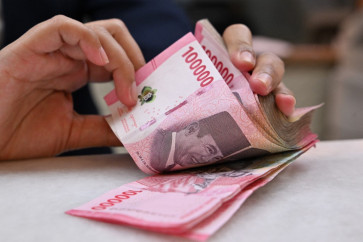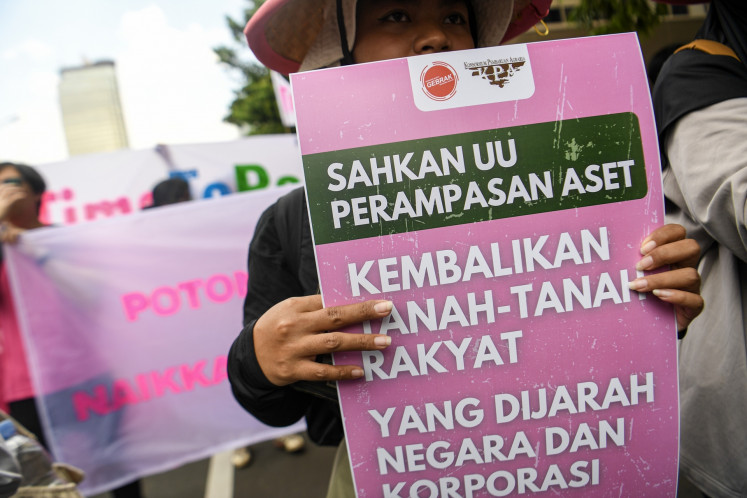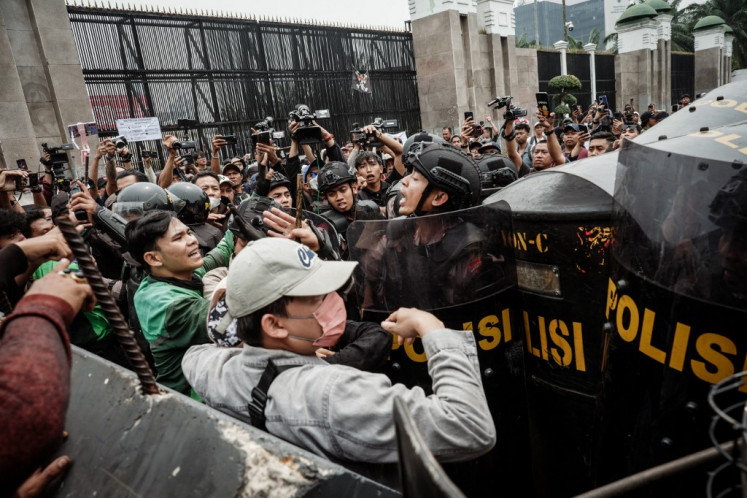Popular Reads
Top Results
Can't find what you're looking for?
View all search resultsPopular Reads
Top Results
Can't find what you're looking for?
View all search resultsDon’t give up just yet on Indonesia’s democracy: The power of youth
Under the control of media conglomerates, hopes arise from alternative online media run mostly by young people unaffiliated with big players.
Change text size
Gift Premium Articles
to Anyone
I
n 1998, I was at the center of a historic transformation of Indonesia, Southeast Asia’s most populous country, from an authoritarian state into a democracy.
Standing on the second floor of my high school’s building, an innocent 16-year-old me saw a group of journalists hunting stories on the fate of Soeharto’s 32-year regime at the Attorney General’s Office, which is located next to my school. Meanwhile, less than 6 kilometers away, thousands of students staged a huge protest outside the House of Representatives, demanding the resignation of the president.
Fast forward 22 years and, from my laptop screen, I saw the same spirit erupt in October when thousands of protesters gathered outside the House to reject the newly passed Job Creation Law.
The administration of President Joko “Jokowi” Widodo has become the target of the protest for initiating the omnibus bill, which many say sacrifices labor rights and the environment for the sake of investment.
Last year, students and activists rallied against controversial bills, including the revision of the Corruption Eradication Commission (KPK) Law which clearly weakened the antigraft body.
This wave of protests came against the backdrop of scholarly analyses that Indonesian democracy is deteriorating, if not dying.
The Institute of Research, Education and Information of Social and Economic Affairs (LP3ES) recently said that the democracy in Indonesia, the third largest in the world, is regressing and getting worse with the COVID-19 pandemic ravaging the nation.
Indonesia has exceeded the 500,000 mark in COVID-19 cases, the highest in Southeast Asia, with the mortality rate the second-highest, after India. Concerns have mounted on the government’s inability to contain the spread of the virus, and the poor COVID-19 response seems to have taken its toll on its democracy.
Echoing LP3ES’s view, a group of Australian scholars has published a book that raises the same worry. It argues that the COVID-19 pandemic has forced the country back into authoritarianism. They refer to a string of regulations issued to silence citizens who criticize the government’s bad policies related to COVID-19. A number of people have been arrested and charged with insulting the government or spreading hatred against the government.
They concluded that, after more than 20 years, the hard-won democracy had regressed back to authoritarianism under Jokowi. After stagnation during the administration of Jokowi’s predecessor, Susilo Bambang Yudhoyono, Indonesia’s democracy has hit its lowest point.
Many scholars have seen this coming.
Despite being lauded as the beacon of democracy for ticking all the boxes on the requirements list for becoming a democratic nation amid the global democratic recession in the early 2000s, some were cautious to acknowledge the success of bureaucratic reforms, free and fair elections and freedom of the press in Indonesia.
The skeptics believe that the old power emanating from Indonesia’s authoritarian regime exists up until today by integrating smoothly into the new democratic system and using its influence to maintain authority.
Old oligarchies are alive and kicking, sneaking into the bureaucracy, political parties and media, dripping antidemocratic poison from within.
One of their obvious successes is turning Indonesia’s media, deemed one of the most robust globally in the late 1990s, into one of the most concentrated industries. From being under the control of 13 media conglomerates in 2011 and 11 in 2012, Indonesia’s media now fall under the auspices of only eight media barons with close affiliation to political parties and corporations. Their influence has resulted in a decline of quality and diversity of information.
The optimist in me refuses to give up just yet. Call me nostalgic, but looking at mass protests last month and last year restores my faith in this country’s democracy as they remind me of a similar movement back in 1998, when students, activists and labor unions united and took to the streets demanding an end to the government’s repression.
I can see how the young generation continues to be the backbone of Indonesia’s democracy. Students and young activists were behind the massive #reformasidikorupsi (Reform Era corrupted) protest movement last year, believed to be the largest one since that of 1998.
These young, educated, middle class people are what sociologist Ariel Heryanto describes as urban intelligentsia, who play key roles in mobilizing public opinion against the status quo in Indonesia’s political system back in 1998.
Another version of urban intelligentsia has made a return in the new era using social media, trying to counter the government’s narratives by posting on Twitter, Facebook and Instagram.
Many have underestimated this young force, as its operation has never translated into an effective and coherent power in Indonesia. Yet, we are talking about a movement that more than two decades ago managed to topple one of the longest reigning dictatorships in the region.
This young blood has also given hope for Indonesia’s concentrated media system.
Under the control of media conglomerates, hopes arise from alternative online media run mostly by young people unaffiliated with big players. These media, like Magdalene.co, Vice Indonesia, Asumsi.co and The Conversation Indonesia raise important issues on marginal communities, offer different perspectives and challenge the government’s policies and narratives with research-based analyses.
As Indonesian democracy is in jeopardy, I recall the feeling of the 16-years-old me being trapped at the center of the country’s tumultuous time.
However, despite concerns about its deteriorating state, Indonesia’s democracy will prevail, simply because almost a quarter of the country’s people are young and eager for change. No force can stop them.
***
The writer is head of editorial at The Conversation Indonesia.










